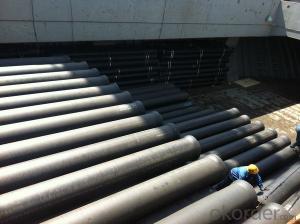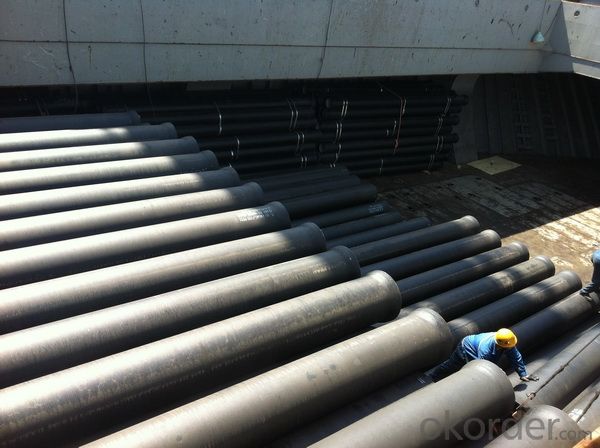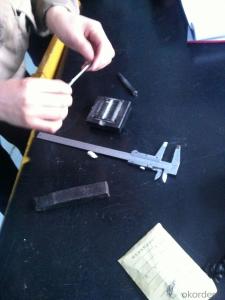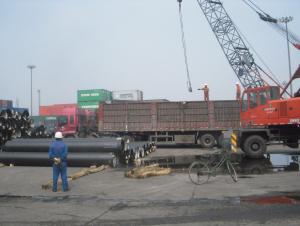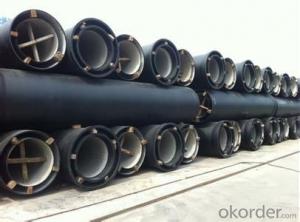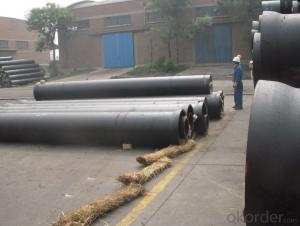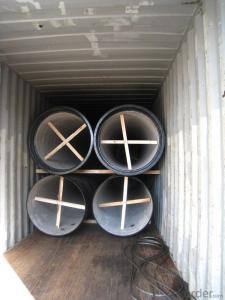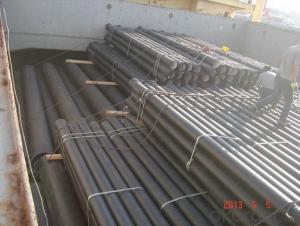DUCTILE IRON PIPES AND PIPE FITTINGS K8 CLASS DN400
- Loading Port:
- Tianjin
- Payment Terms:
- TT OR LC
- Min Order Qty:
- 22 pc
- Supply Capability:
- 3000 pc/month
OKorder Service Pledge
OKorder Financial Service
You Might Also Like
Material : Ductile Cast Iron
Size Range : DN 80mm to DN 2000mm
Unit Effective Length : 6m or 5.7m
Manufacture Standard: ISO 2531:1998/ EN 545:2006/EN 598:2007
Annual capacity : 200,000 tons
Coating Exterior: Zinc 130g/m2 according to ISO 8179-1 and bitumen coating 70 microns.
Cement Interior: Portland Cement/ High Alumina Cement/ Sulphate Resisting Cement Lining according to ISO 4179
Special requirements on external coating and internal lining can be applied
We also provide accessories such as SBR/EPDM rubber gaskets, lubricant paste, pipe caps, PE sleeves, etc.
Additional Parts:
Each pipe is strictly inspected according to related standard to ensure permanently high performance.
Easy Installation at site and service free for life
Long Service Lifespan
Quotation will arrive you within 24hours once we get your inquiry.
We guarantee offering you a competitive price.
A copy of original inspection reports of pipes will be offered after shipment.
Photos of loading process will be sent to the customer after shipment effect.
We will follow-up the delivery progress after shipment effect and update to the customer on weekly basis.
- Q: What is the expected leakage rate for ductile iron pipes?
- The expected leakage rate for ductile iron pipes can differ depending on various factors like the pipes' age, condition, and installation approaches, as well as the quality of materials employed. Nevertheless, ductile iron pipes generally have a reputation for being durable and having low leakage rates compared to other pipe materials. Based on industry standards and research studies, well-maintained ductile iron pipes are expected to have a leakage rate as low as 0.1% per year. This implies that, on average, less than 1 liter of water may leak per meter of pipe length annually. However, it is important to note that this is an average value and actual leakage rates can vary. Regular maintenance and inspections are crucial in minimizing leaks and ensuring the longevity of ductile iron pipes. Additionally, proper installation techniques, such as using effective jointing methods and appropriate bedding and backfill materials, can also contribute to reducing leakage rates. To determine the expected leakage rate for specific ductile iron pipe installations, it is recommended to consult industry professionals and adhere to applicable standards and regulations.
- Q: Can ductile iron pipes be used in areas with high soil acidity?
- Ductile iron pipes can be used in areas with high soil acidity, but certain precautions should be taken to ensure their longevity and performance. Ductile iron pipes are known for their strength, durability, and resistance to corrosion, which makes them suitable for various soil conditions, including those with high acidity. However, high soil acidity can still pose a potential risk to ductile iron pipes over time. Acidic soils can accelerate the corrosion process, potentially leading to the degradation of the pipe material. To mitigate this risk, several measures can be implemented: 1. Protective Coatings: Applying protective coatings to the outer surface of the ductile iron pipes can provide an extra layer of defense against soil acidity. These coatings, such as epoxy or polyethylene, act as a barrier, preventing direct contact between the pipe and the corrosive soil. 2. pH Adjustment: Adjusting the pH levels of the soil can help reduce its acidity. This can be done by adding lime or other neutralizing agents to the soil, which will help create a more favorable environment for the ductile iron pipes. 3. Cathodic Protection: Implementing cathodic protection systems can be an effective method to prevent corrosion in ductile iron pipes. This technique involves the use of sacrificial anodes or impressed current systems to create a protective electrical current that counteracts the corrosive effects of the soil. 4. Regular Inspections: Periodic inspections should be conducted to monitor the condition of the ductile iron pipes in areas with high soil acidity. This allows for early detection of any corrosion or degradation, enabling timely repairs or replacements to be carried out. By implementing these measures, ductile iron pipes can be effectively used in areas with high soil acidity, ensuring their long-term performance and minimizing the risks associated with corrosive soils. However, it is always recommended to consult with experts or engineers familiar with local soil conditions and the specific requirements of the project to determine the most suitable materials and protective measures.
- Q: How does ductile iron pipe handle soil movements and settlements?
- Ductile iron pipe has excellent resistance to soil movements and settlements due to its high tensile strength and flexibility. The pipe's ability to withstand soil loads and settle without compromising its structural integrity makes it a reliable choice for underground applications. Additionally, the pipe's joint design allows for some degree of movement, further reducing the risk of damage or failure.
- Q: Can ductile iron pipe be used for industrial process piping?
- Yes, ductile iron pipe can be used for industrial process piping. Ductile iron pipe is known for its strength, durability, and corrosion resistance, making it suitable for various industrial applications including process piping. It can handle high-pressure and high-temperature environments, making it a reliable choice for transporting fluids and gases in industrial settings.
- Q: Can ductile iron pipe be used for chemical processing plant applications?
- Yes, ductile iron pipe can be used for chemical processing plant applications. It is durable, corrosion-resistant, and has high tensile strength, making it suitable for transporting various chemicals and fluids in such environments. Additionally, its flexibility and ease of installation make it a practical choice for piping systems in chemical processing plants.
- Q: Will nodular cast iron pipes rust?
- Although the wall has a long flow of water, but oxygen scarce, compared with the outer wall is not easy to corrosion, but there is cement lining is necessary.
- Q: Do rigid cement cast iron pipes need cement piers?
- Ductile weakness: ductile cast iron pipes connected by human factors such as the operation level of responsibility, influence, construction not convenient. The advantages of PE PE PE pipe has good corrosion resistance and its anti inorganic performance than that of the metal pipe is much stronger in the buried without corrosion, construction convenient. Small diameter PE pipe in the price performance ratio is better than that of steel and ductile iron.PE tube have disadvantages: benzene, gasoline, carbon tetrachloride and other organic solvents have certain effect on pe. If the organic solvent is infiltrated into the polyethylene, the swelling will occur, and its physical properties will be decreased. Its pressure resistance and temperature resistance are poor.
- Q: Can ductile iron pipe be used for hydropower systems?
- Yes, ductile iron pipe can be used for hydropower systems. Ductile iron pipes are known for their strength, durability, and high-pressure capabilities, making them suitable for transporting water in hydropower systems. Additionally, ductile iron pipes have excellent corrosion resistance, which is crucial for long-term use in water-based applications.
- Q: How to distinguish flexible and rigid interfaces between cast iron pipe joints
- Rigidity is a way of connection that has been eliminated. Sealing is achieved by pouring cement into the spigot
- Q: Advantages and disadvantages of ductile iron pipes
- The ductile iron pipe is widely used not only in foreign countries, and has also been in the country to promote the use of good, in many areas of our country, ductile iron pipe has been widely used in medium and small diameter water supply pipe; compare the performance of ductile iron pipe and steel pipe: steel pipe can be divided into seamed steel pipe and seamless in the water supply pipe, commonly used in welded tube. Compared with ductile iron pipes, the steel tube has the advantages of good toughness, high tensile strength, thin tube wall, high pressure resistance, long pipes and less interfaces. The biggest drawback is that the corrosion resistance is poor and the price is high. So, in general, except for small bore pipes and special projects (such as pipe jacking works);
Send your message to us
DUCTILE IRON PIPES AND PIPE FITTINGS K8 CLASS DN400
- Loading Port:
- Tianjin
- Payment Terms:
- TT OR LC
- Min Order Qty:
- 22 pc
- Supply Capability:
- 3000 pc/month
OKorder Service Pledge
OKorder Financial Service
Similar products
Hot products
Hot Searches
Related keywords
